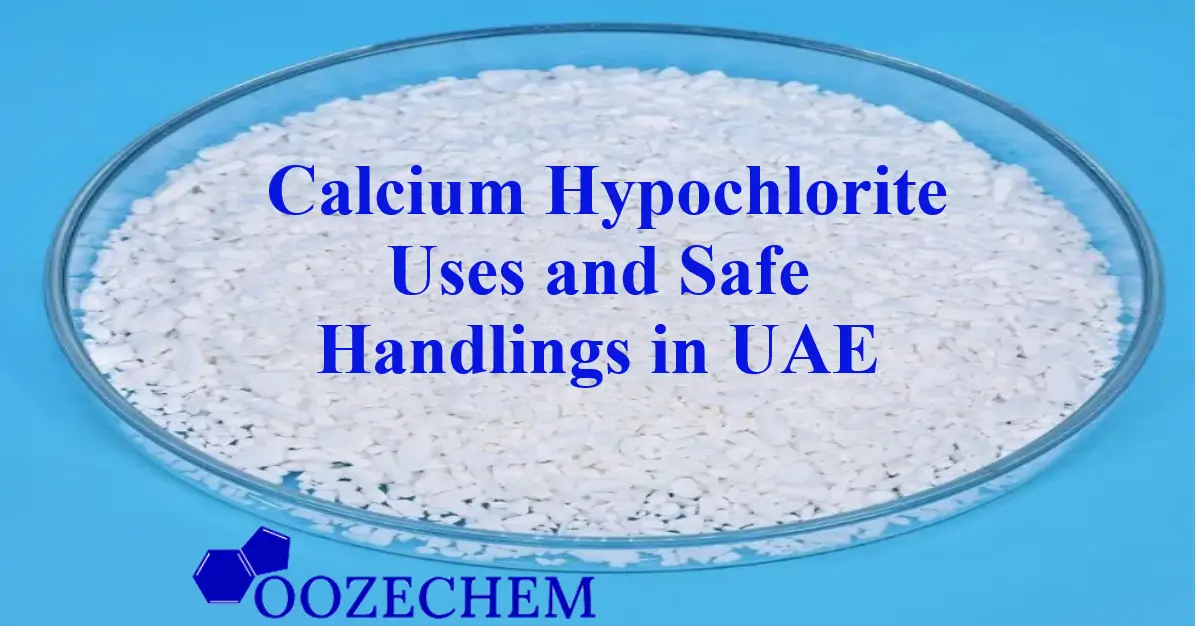Looking for a powerful disinfectant that can tackle everything from swimming pools to industrial cleaning? You’ve probably encountered uses of calcium hypochlorite, one of the most versatile chemicals in modern sanitation. In this comprehensive guide, we’ll dive deep into what makes this compound so effective, its Industrial applications, and how to handle it safely.
What is Calcium Hypochlorite?
Calcium hypochlorite is an inorganic compound with the chemical formula Ca(OCl)₂ (also written as Ca(ClO)₂). This white or grayish powder packs a serious punch when it comes to disinfection and bleaching. You might know it by its more common names: bleaching powder, calcium hypochlorite bleach, or simply “cal hypo.”
What makes this compound so special? When dissolved in water, it releases chlorine – nature’s most effective pathogen killer. This process transforms ordinary water into a powerful disinfectant capable of eliminating bacteria, viruses, algae, and other harmful microorganisms.
How Does Calcium Hypochlorite Work?
The science behind calcium hypochlorite is fascinating yet straightforward. When the compound dissolves in water, it dissociates into calcium ions (Ca²⁺) and hypochlorite ions (ClO⁻). These hypochlorite ions are the real heroes – they act as powerful oxidizers.
Here’s what happens at the molecular level:
- The oxygen in ClO⁻ oxidizes proteins in germs and pathogens
- This oxidation process destroys the cell walls of bacteria and viruses
- The result? Dead microorganisms and clean, safe water
It’s like having millions of tiny soldiers working around the clock to keep your water pristine and safe.
8 Essential Uses of Calcium Hypochlorite
Swimming Pool Water Treatment
If you’ve ever enjoyed a crystal-clear swimming pool, you can thank calcium hypochlorite. Pool owners and operators rely on this chemical to maintain safe, swimmable water. Here’s why it’s the gold standard:
- Kills bacteria and viruses that could cause recreational water illnesses
- Eliminates algae that turns pools green and slimy
- Works effectively even under intense sunlight and high temperatures
- Available in convenient forms – tablets, powder, or granules

Pro tip: Always add calcium hypochlorite to water, never water to the chemical, to prevent dangerous reactions.
Municipal Water Treatment
Clean drinking water is a basic human right, and calcium hypochlorite helps make it possible worldwide. Water treatment plants use this compound to:
- Disinfect public water supplies
- Eliminate waterborne pathogens like cholera, typhoid, and hepatitis A
- Provide emergency water treatment in disaster situations
- Ensure safe drinking water in developing countries
The World Health Organization recognizes calcium hypochlorite as an essential tool in preventing waterborne diseases that affect millions globally.
Industrial Cleaning and Sanitation
Industries dealing with food, pharmaceuticals, and healthcare rely heavily on calcium hypochlorite for maintaining sterile environments:
- Food processing facilities use it to sanitize equipment and surfaces
- Hospitals and clinics depend on it for disinfecting medical devices
- Pharmaceutical companies use it in manufacturing clean rooms
- Textile industries utilize it for bleaching and cleaning processes
Household Cleaning Applications
You’ll find calcium hypochlorite in many household cleaning products, though often in diluted forms:
- Kitchen surface disinfection (cutting boards, countertops)
- Bathroom cleaning and mold removal
- Laundry bleaching and stain removal
- General household sanitization

Safety note: Never mix calcium hypochlorite products with ammonia-based cleaners or acids, as this can produce toxic chlorine gas.
Technology Manufacturing
Here’s something that might surprise you: that smartphone or computer you’re using right now likely owes its existence partly to calcium hypochlorite. The semiconductor industry uses this chemical in manufacturing silicon microchips found in:
- Computers and laptops
- Smartphones and tablets
- Television sets
- Kitchen appliances
- Automotive electronics
Agricultural Applications
Modern agriculture benefits from calcium hypochlorite in several ways:
- Irrigation system disinfection prevents the spread of plant diseases
- Tool and equipment sanitization reduces contamination risks
- Greenhouse cleaning maintains optimal growing conditions
- Post-harvest treatment extends produce shelf life
Pest Control
Calcium hypochlorite serves as an effective component in pest management:
- Acts as a liquid pesticide for certain applications
- Inhibits growth of disease-causing organisms
- Prevents pest infestations in stored products
- Controls algae in water storage systems
Paper and Textile Industry
The manufacturing sector relies on calcium hypochlorite for:
- Paper bleaching to achieve bright white paper products
- Textile treatment for whitening fabrics
- Pulp processing in paper mills
- Fabric sanitization in textile manufacturing
Calcium Hypochlorite: Advantages and Benefits
| Advantage | Description | Impact |
| High Effectiveness | Kills 99.9% of bacteria, viruses, and algae | Superior sanitation results |
| Stability | Long shelf life when stored properly | Cost-effective for bulk purchases |
| Versatility | Multiple applications across industries | One chemical, many solutions |
| Fast Action | Rapid pathogen elimination | Quick results, less downtime |
| Cost-Effective | Relatively inexpensive compared to alternatives | Budget-friendly disinfection |
| Widely Available | Easy to source globally | Reliable supply chain |
| Proven Track Record | Decades of successful use | Trusted by professionals worldwide |
Safe Handling Guidelines
- Safety goggles to protect eyes
- Chemical-resistant gloves for hand protection
- Face masks or respirators to prevent inhalation
- Long-sleeved clothing to minimize skin contact
Storage Best Practices
- Store in cool, dry, well-ventilated areas
- Keep away from flammable materials
- Avoid moisture exposure
- Use original containers with proper labeling
- Maintain temperature below 35°C (95°F)
Mixing and Application Safety
- Always add chemical to water, never the reverse
- Never mix with acids or ammonia-based products
- Use in well-ventilated areas
- Have safety data sheets readily available
- Train all personnel in proper handling procedures
2025 Market Overview
As of 2025, industrial-grade calcium hypochlorite ranges from $800-1500 per metric ton for bulk purchases. Smaller quantities for residential use cost significantly more per unit but remain affordable for most applications.
Dosage Regulations
According to FDA guidelines, calcium hypochlorite in food applications should not exceed:
- 0.82 grams per 100 grams of dry food (standard threshold)
- 0.36 grams per 100 grams for sensitive applications
Criteria for Choosing the Right Calcium Hypochlorite Supplier
- Quality certifications and testing protocols
- Reliable supply chain and delivery schedules
- Technical support and application guidance
- Competitive pricing and bulk discounts
- Safety training and documentation
Frequently Asked Questions
Is calcium hypochlorite safe for drinking water?
Yes, when used according to WHO and EPA guidelines, calcium hypochlorite is safe for drinking water treatment. The key is using appropriate concentrations and allowing proper contact time.
How long does calcium hypochlorite last?
When stored properly in cool, dry conditions, calcium hypochlorite can maintain its effectiveness for 1-3 years. However, it gradually loses potency over time.
Can I use calcium hypochlorite in my home pool?
Absolutely! It’s one of the most popular pool sanitizers. Just ensure you follow manufacturer instructions and maintain proper water balance.
What’s the difference between calcium hypochlorite and sodium hypochlorite?
Calcium hypochlorite is more stable and has higher available chlorine content, making it better for long-term storage. Sodium hypochlorite (liquid bleach) is more convenient for immediate use but degrades faster.
Conclusion
Calcium hypochlorite stands as one of the most valuable chemicals in modern sanitation and industrial applications. From keeping swimming pools crystal clear to ensuring safe drinking water for millions worldwide, this powerful compound continues to play a vital role in public health and safety.
Understanding its proper use, safety requirements, and environmental considerations allows us to harness its full potential while minimizing risks. Whether you’re a facility manager, pool operator, or simply someone interested in water treatment, knowledge of calcium hypochlorite’s capabilities and limitations is invaluable.
